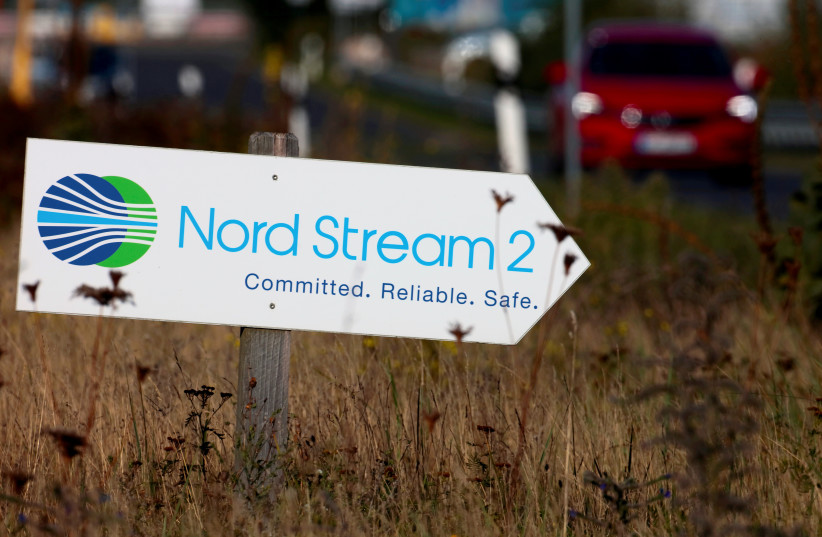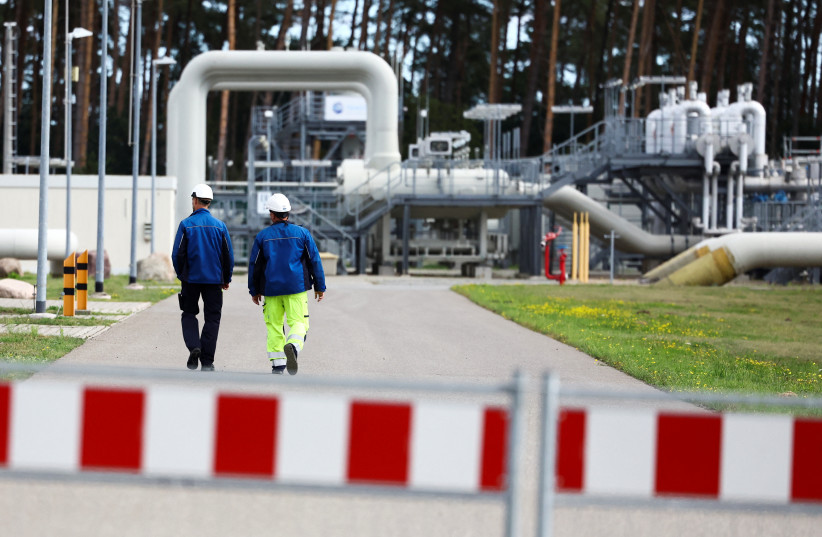by Seth J. Frantzman
The damage to Nord Stream is important and symbolic, and will also likely usher in a new global economic world order.
 |
A road sign directs traffic towards the Nord Stream 2 gas line
landfall facility entrance in Lubmin, Germany, September 10, 2020.
(photo credit: REUTERS/HANNIBAL HANSCHKE/FILE PHOTO)
|
The destruction of two important pipelines that run from Russia to Europe will likely herald a new global phase of trade as Europe and the West cement their rupture in ties with Russia and become more self-reliant. Decades in which European countries sought to tie themselves to Moscow via energy deals and in which they believed that free markets and global trade would make regimes like Russia and China friendlier, have now led to a permanent shift.
The reasons for this shift have been a growing trend. The US has been warning for years about the problems with the Nord Stream natural gas pipeline. According to the pipelines’ website, the two “1,224-kilometer [761-mile] offshore pipelines are the most direct connection between the vast gas reserves in Russia and energy markets in the European Union.”
Construction of the first line was completed in 2011. Billed as a “secure gas supply for Europe,” the lines were supposed to transport a combined total of 55 billion cubic meters (bcm) of gas a year. But over time, the US and other critics became concerned that this would enable Russia to have its hand on the spigot and use energy as a weapon, making Europe too dependent.
The US began sanctioning Nord Stream 2 in 2017. But European countries, especially Germany under former chancellor Angela Merkel, were in favor of the projects.
Now the pipelines have been damaged in a mysterious incident that unfolded over the weekend. It is widely believed to be sabotage, and it appears that Russia is behind it. This came as a new Baltic pipeline was being inaugurated. The action appears to send a message to the West that pipelines and energy are not safe. It is like Mafia blackmail in which European countries are now being told, “You never know when this might happen again.”
A worrying picture

Headlines on September 29 painted an increasingly worrying picture. CNN said that European security officials say Russian ships were in the waters near the pipeline when the leaks occurred. A fourth leak was discovered on Thursday. According to Reuters, “NATO Secretary-General Jens Stoltenberg on Wednesday attributed the leaks on the Nord Stream pipelines to acts of sabotage and said he had discussed the protection of critical infrastructure in NATO countries with the Danish defense minister.”
Reports say that seismic meters recorded the explosions that damaged the lines. Now there is concern that a new phase of “hybrid war” may be coming, and Russia could use these kinds of incidents to upset the global order.
It’s worth thinking about what this means globally. Nord Stream was seen as an important project worth tens of billions of dollars, mostly financed by banks in Europe and by Gazprom. Reports said that Gazprom’s investments were driven by Moscow’s interests and geopolitics.
Russia was not only working on these lines – bypassing Baltic states and trying to literally get Europe addicted to the line from Moscow directly – but Russia was also moving ahead with Turk Stream, a project under the Black Sea to Turkey. This means that Turkey was also angling with Russia to make Europe dependent.
How does this impact Israel?
This matters also for Israel and the Middle East because Israel, Greece and Cyprus wanted to partner on an East Med line. It’s not a coincidence that Iranian-backed Hezbollah has threatened the Karish gas field off the coast. Iran has exported drones to Hezbollah, which has tried to use them to threaten the infrastructure working the field. Russia is also acquiring Iranian drones and using them against Ukraine.
The threat that Hezbollah poses to offshore gas platforms – and that Russia apparently poses to undersea pipelines going to Europe – links to related aspects of this hybrid war and shows how non-Western regimes may work together to wreak havoc on energy supplies.
The realization that Russia cannot be trusted to supply gas securely to Europe is leading to an earthshaking, once-in-a-generation event. Global economies, which have been marching zombie-like in one direction toward globalization and knitting everyone together, are now moving in a new direction.
This regional protectionism is embodied not only by Europe’s shift away from relying on Russian gas, but also by forums like the Shanghai Cooperation Organization, where Russia, China, Turkey, Iran and other regimes recently met. Those countries want to work together and they are almost all authoritarian regimes.
Meanwhile, the US, Europe and Western states, and their allies in Asia such as Japan, South Korea and India, also want to work together. Israel’s growing ties with the United Arab Emirates and with South Korea, with free trade talks recently resulting in a new deal, represent an important step for the global economy and the Eastern Mediterranean.
Connecting the dots between Europe, the US, Israel, the UAE, India, Australia and other countries makes economic sense – but it also showcases how global trade networks are shifting.
COVID enters the scene
At the same time, the COVID crisis – and Beijing’s decision to crack down internally and cut itself off from the world – reversed decades in which countries relied on and invested in China. Apple recently shifted some iPhone production to India, according to reports. This is a big shift in manufacturing strategy, CNBC said. Indeed, many companies and countries are now more wary of Beijing. China’s endless lockdowns and chaos, as well as the crackdowns in Hong Kong and other authoritarian trends, make it unclear how companies and countries can rely on China.
The lack of a full investigation into the origins of COVID, and missteps in handling the outbreak in December and January 2020, mean that countries know they can’t rely on an authoritarian regime for their health security, or for metals and microchips and other things. Now the West and big consumer countries will think twice.
The globalization trend was part of the US-led global world order inaugurated in the 1990s. The end of the Cold War brought economic and political liberalization. Neo-liberal agendas were supposed to wash away protectionism. But this didn’t work, and the global war on terrorism and other trends sabotaged the march toward a liberal, rules-based world order.
Instead, the new world order that George H.W. Bush had promised has turned into an authoritarian one. Democracies are finally understanding that hitching their economies to Moscow or Beijing can have catastrophic consequences. The damage to the Nord Stream pipeline is important and symbolic – and will also likely usher in a new global economic world order, amid a rise in tensions between the West and Russia.
Seth J. Frantzman
Source: https://www.jpost.com/international/article-718432
No comments:
Post a Comment